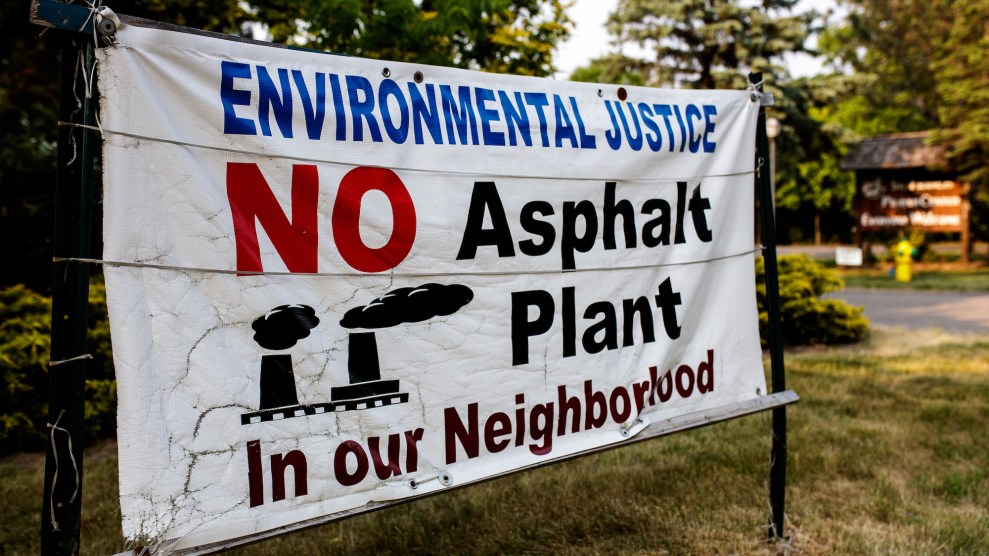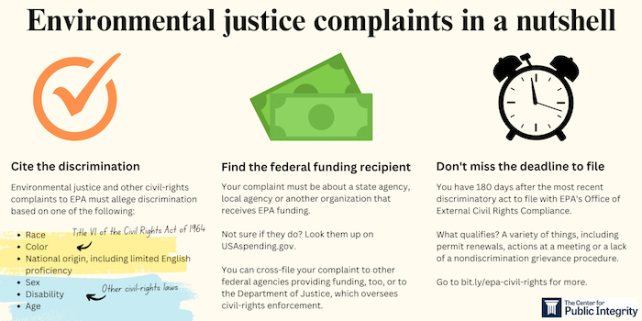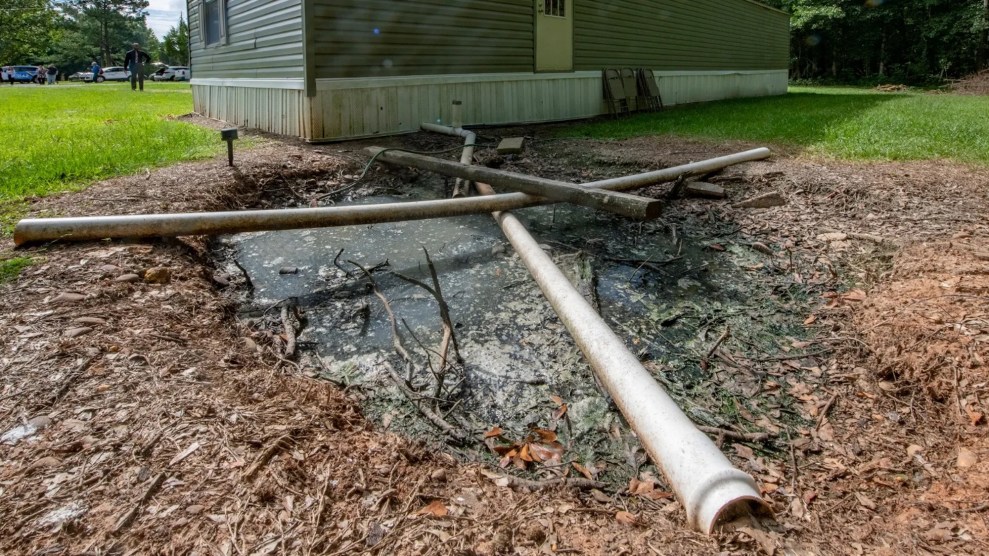
A sign in protest of the recently built asphalt plant stands outside of St. Francis Prayer Center on Wednesday, June 6, 2023 in Flint, Michigan. Jenifer Veloso/Center for Public Integrity
This story is published in partnership with the Center for Public Integrity, a newsroom that investigates inequality.
Is your neighborhood choked with pollution or facing other environmental woes that you think are discriminatory? You can write to the US Environmental Protection Agency to request an intervention.
But it’s easy to get tripped up.
That’s what the Center for Public Integrity found as part of a new investigation of EPA’s handling of complaints under the Biden administration, comparing their treatment with petitions in the previous quarter-century.
We learned a lot about the barriers that people face despite the administration’s promises—and efforts—to prioritize environmental justice. Most complaints are still rejected without an investigation. Often that’s because the people filing them didn’t know how the process works. They were just trying to get help.
We also found that complaints making it past the agency’s initial check steps are more likely now to get action than in previous years. (How helpful that action will be remains to be seen in many cases.)

What’s clear: If you go down this path, you want to jump the early hurdles.
Here’s what you need to know to increase your odds of success.
Your complaint has to say who’s causing the problem. And only certain types of organizations qualify.
As EPA notes in a how-to about its process, it investigates complaints about recipients of EPA financial assistance. Grants, for instance.
So, what if the issue you want to be addressed involves a new or expanding industrial facility? It’s likely you’ll need to complain about the government agency issuing permits to that facility, not the facility owner. Why this limitation? Because the complaint process here and at other federal agencies stems from the Civil Rights Act of 1964 and other laws banning discrimination by recipients of—you guessed it—federal funds.
Of the civil-rights complaints filed since January 2014 and rejected by EPA without an investigation, more than half failed to identify a funding recipient. So this matters.
And here’s the thing: A lot of state and local agencies, not to mention tribal governments, universities, companies, and other entities, receive EPA grants or contracts. More than $4 billion in grants alone flow from the agency every year to its recipients. The money supports activities ranging from air-quality improvements to lead pipe replacement.
So, many agencies in your region probably receive grants or other assistance from EPA. Some of those agencies make decisions that can improve or worsen environmental justice.
If you know who you want to file a complaint about, you can ask EPA or the organization in question whether it’s a current funding recipient. You can also search on USAspending.gov—you can download a spreadsheet listing every EPA funding recipient in the current year, for instance.
If you don’t know who’s responsible for the environmental justice issue you’re facing, you can do some research.
Think about permits, zoning, and other decisions about how to use property: Did an agency take an action that allowed pollution to be increased in an already overburdened area?
Think about enforcement: Is an agency being inconsistent, such as making farming operations comply with rules in a majority white area but not a majority Black area?
Think about resources: Have agencies failed to install or maintain infrastructure such as storm drains in communities of color?
You can name an agency, cross your fingers, and let EPA figure out whether it’s a recipient. But if you do that work yourself, you might realize—for example—that it’s your state’s environmental agency that you need to name, rather than your city’s.
(If there’s no responsible organization receiving EPA funds, you might be able to complain to a different federal agency. More on that below.)
EPA’s Office of External Civil Rights Compliance takes complaints that allege discrimination based on one or more of the following:
- Race
- Color
- National origin, including limited English proficiency
- Sex
- Disability
- Age
Additionally, EPA will consider complaints alleging intimidation or retaliation that violates its nondiscrimination regulation.
If you’re dealing with an environmental issue that doesn’t involve discrimination, this isn’t the process you want. The Office of External Civil Rights Compliance will sometimes forward those types of complaints to one of EPA’s regional offices, so you could save time by contacting your regional office directly to see if they can help in such a case.
A complaint must arrive within 180 days of the most recent act of alleged discrimination. EPA could, in theory, make an exception if you’re late “for good cause,” but don’t count on that.
One in 10 of the complaints EPA rejected in recent years were marked “untimely,” Public Integrity found.
What’s an example of an action that starts this clock ticking? In many successful complaints, it’s a permit approval.
But not always. Another example is failing to provide interpreters at public meetings to help people meaningfully participate when agencies consider proposals that would lead to more pollution.
The three categories mentioned above—funding recipient, discrimination, and timeliness—are mandatory parts of a complaint. Make sure at a minimum that you’re complaining about a recipient of EPA funding within 180 days of an alleged discriminatory action they took.
A concise email laying out the issues can be as successful as a long report. (You can find examples of both later in this article.)
Include your name, signature (electronic is fine), and contact information when you file. The office doesn’t investigate anonymous complaints.
You can write your complaint in the language you know best. EPA’s manual says its civil-rights office “will take all necessary steps to ensure that persons who have limited English proficiency can participate meaningfully in its complaint process.”
Email your complaint to Title_VI_Complaints@epa.gov. Or mail it to the US Environmental Protection Agency, Office of External Civil Rights Compliance, Mail code 2310A, 1200 Pennsylvania Avenue, NW, Washington, DC 20460.
More steps that could help (but don’t let them push you past your deadline to file):
Environmental justice complaints to EPA involving “race, color, or national origin” are part of a process authorized by Title VI of the Civil Rights Act of 1964.
You don’t need to mention your complaint is about Title VI when you file. But it doesn’t hurt to be specific.
EPA’s complaints investigation process also incorporates laws banning additional types of discrimination by federal funding recipients, such as disability, sex or age, so you would cite those other laws if your complaint involved such issues. (Note that the law EPA is enforcing about sex discrimination is Title IX of the Education Amendments of 1972, which prohibits such discrimination in an “education program or activity.”)
A federal agency can, without funding from recipients if it finds they’re discriminating and isn’t able to get compliance. But since the passage of Title VI, EPA has never taken that step, to environmental justice advocates’ frustration.
What you’re more likely to see if the agency believes there’s a Title VI violation, is EPA trying to negotiate an agreement with its funding recipient to correct the issue.
“EPA’s regulation requires that it seek the cooperation of EPA recipients in securing compliance with the federal civil rights laws and that we attempt to resolve complaints informally whenever possible,” the agency says in its case resolution manual for this process.
You can tell EPA you’d like to be looped in on those resolution efforts.
You could also inquire, if you’d like, about entering an “alternative dispute resolution” process with the entity you filed the complaint about. That would allow you to try to negotiate an agreement directly. Some of the directly negotiated agreements have been more substantive than EPA’s negotiated deals, we found.
Some environmental law groups, university law clinics, or legal aid organizations represent people pro bono (without charge). You might be able to find help, either in or outside your state.
EPA’s External Civil Rights docket includes links to complaints, and you can look at those to find lawyers doing this work.
Can’t get a lawyer? Don’t despair: This isn’t a court. It’s an administrative process. Though many of the complaints that led to negotiated agreements were filed by lawyers, some were not. (And lawyers who have never filed a Title VI complaint might not be in a great position to help, anyway.)
You can pick up lots of tips from the pros by reading some well-organized complaints, particularly ones that EPA notes in its status column were resolved with an agreement.
Here’s one such example filed by Texas Environmental Justice Advocacy Services and the Sierra Club. Here’s another filed by the West Oakland Environmental Indicators Project, represented by Earthjustice.
The complaints filed by lawyers are often long, but take heart: Much shorter complaint letters have prompted EPA investigations, including this one, written by the president of a homeowners’ association in Georgia.
That complaint cites data from EPA’s EJScreen to make a point. You might find that helpful for your own complaint. With the click of a button, the environmental justice screening and mapping tool lets you compare an area’s demographics and environmental exposures.
Omega R. Wilson co-founded the West End Revitalization Association in Mebane, North Carolina. The group advocates for the majority-Black communities in the area long denied basic services such as safe drinking water and sewer access. His advice for people tackling a federal complaint on their own: You know your community. Write up the facts as clearly as possible. Be specific. Include documentation, if you can.
And stick with it.
“It’s a process,” he said. “Process means you have to follow it.”
Is it “intentional,” meaning you think you can show that the agency responsible for a decision meant to discriminate? Or is it a decision that appears neutral but has discriminatory effects, often referred to as “disparate impact” discrimination?
Either qualifies under federal policy. This NAACP complaint cites both types on behalf of residents in Jackson, Mississippi.
The US Department of Justice has an explainer here.
It’s helpful to include examples that back up your assertions, but remember: You don’t want to miss the 180-day deadline. You can always share more information with EPA after you file.
Explain what results you want to see
What remedies would address the problems you’re facing? Would changing an agency’s process help? Noting this in your complaint can be a good strategy.
If you scroll to the end of the NAACP complaint, for instance, you’ll see an eight-point list under “Relief Requested.”
EPA isn’t the only federal agency with Title VI regulations prohibiting their funding recipients from discriminating. Most have them.
Under the Biden administration, they’re supposed to prioritize environmental justice. The issue cuts across multiple agencies, not just EPA.
One example of that: A 2018 complaint to the US Departments of Justice and Health and Human Services, about discriminatory handling of sanitation access and fines in an Alabama county, ended in a settlement agreement this year.
So, if the environmental justice issue you’re facing doesn’t meet the test for an EPA investigation (for instance, EPA isn’t funding the entity taking discriminatory actions), it still might fit the bill for a different agency.
Also: If your complaint involves an organization that receives funding from multiple federal agencies, you can (and probably should) cross-file it with all of them. The Department of Justice, for instance, has its own form for Title VI complaints as well as a hotline.
Some people cross-file their complaint with the Department of Justice’s Civil Rights Division even if the agency isn’t a funder, requesting it coordinate the investigation and enforcement as part of its oversight role on Title VI. A spokesperson told us the division “accepts all complaints and will review them to determine any next steps.”
Wilson, with the West End Revitalization Association, found that complaining to EPA didn’t get the community anywhere. But the Department of Justice was a different matter.
One of the complaints, filed in 1999, was about the West End’s lack of basic services and a planned highway bypass aimed right through it.
“Over 70-some houses were saved, two churches and a cemetery that dates back to slavery,” Wilson said. Not only did federal intervention result in an altered route, he said, but a number of residents received direct assistance, including much-needed water and sewage upgrades.
“You have a right to basic amenities,” Wilson said.
Some groups have addressed discriminatory environmental pollution or contamination by filing lawsuits.
But you probably would sue under an environmental law rather than Title VI. While federal policies consider discriminatory impacts to be a violation, the Supreme Court has ruled that individuals can sue under Title VI only if the federal funding recipient intended to discriminate. That standard is a lot harder to prove.
(The federal government’s greater ability to enforce Title VI is one of the reasons people have pressed EPA to make its investigations meaningful after many years of weak action. It’s also why some conservative politicians are trying to stop the agency from investigating anything but intentional discrimination.)
Still, there might be other avenues for people hoping for court intervention. One lawsuit filed this year on behalf of Black residents of a Louisiana parish alleges their exposure to pollution violates the Fourteenth Amendment’s Equal Protection Clause as well as the Thirteenth Amendment.
Meanwhile, EPA’s National Environmental Justice Advisory Council and the White House Environmental Justice Advisory Council both hold meetings where you might be able to speak or submit comments to about your community’s problems.
And finally, pressing for local action can be powerful. Local agencies and commissions are frequently involved in planning and other decisions that affect environmental health.
In one California community contaminated by lead, residents organized, teamed up with university researchers, ran for office, and changed how their local officials were handling the problem.
Sustained pressure on agencies to do better can move the needle. EPA’s Title VI process is a case in point. As much as advocates bemoan the ways that EPA fails to fully enforce its own regulations, they say they see signs of progress, from the agency’s online docket to speedier resolutions.
“Communities have advocated for two decades for greater transparency, accountability, and responsiveness from EPA,” said lawyer Amy Laura Cahn, a member of the Title VI Alliance, which works to bolster enforcement of laws at the intersection of civil rights and environmental justice. “And these are hard-fought wins.”











